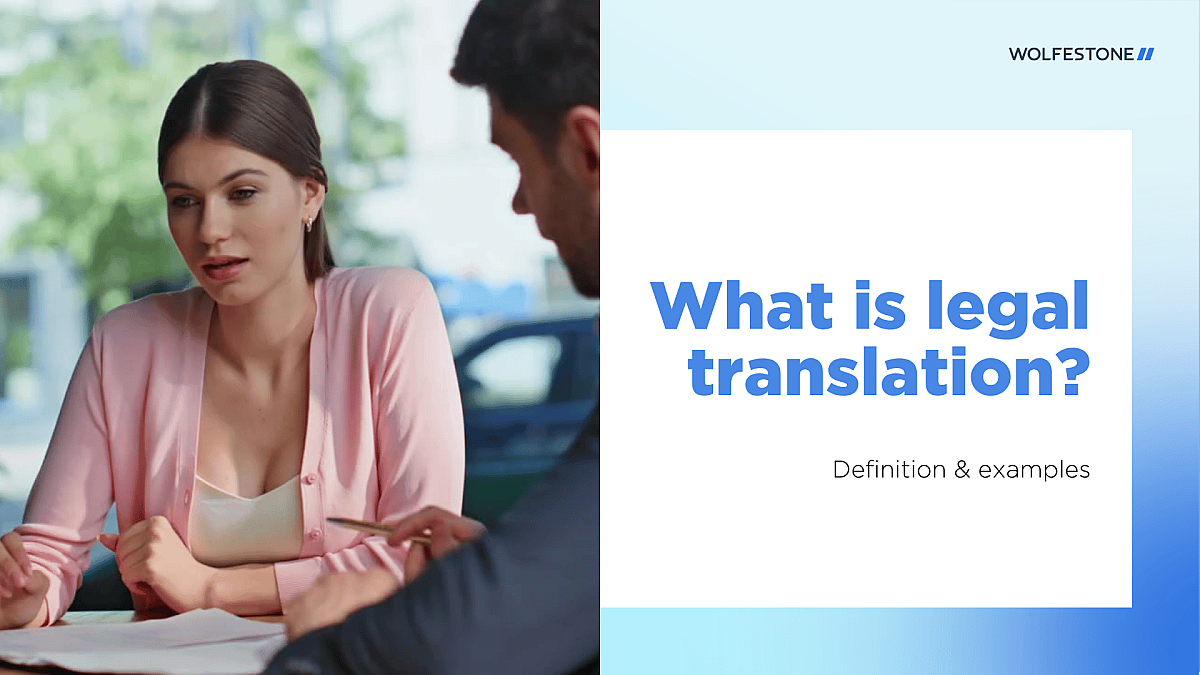𝘈𝘱𝘱𝘳𝘰𝘹 𝘳𝘦𝘢𝘥 𝘵𝘪𝘮𝘦: 4 𝘮𝘪𝘯𝘴🕒
Simply, legal translation is translating documents that have legal force or implications — such as contracts, court judgments, statutes, patents, licences, affidavits or incorporation documents — from one language into another, while preserving their legal meaning, structure and terminology.
Legal translators must understand legal systems, terminologies and conventions in both source and target language/jurisdiction to ensure accuracy and enforceability.
When is legal translation needed?
You’ll typically encounter the need for legal translation in situations like:
-
Cross-border contracts or joint ventures
-
Litigation, arbitration or court proceedings involving foreign parties
-
Intellectual property filings and patent applications
-
Regulatory submissions to foreign authorities
-
Immigration or visa documents
-
Mergers, acquisitions, and tangible assets transfers
Death, birth and marriage certificates
Sometimes the original document may already be lawful in one country, but when it crosses borders or interacts with foreign systems, translation ensures that meaning is properly conveyed and legally recognised.
What makes a legal translation valid/certified?
To ensure a translated document is accepted by legal, government or academic bodies, it should include:
-
A declaration or statement of accuracy (e.g. “I certify that this translation is accurate and complete to the best of my knowledge”)
-
The translator’s name, signature, contact information and credentials
-
The date of translation
-
Any notes on formatting, page numbering or reference to the original
-
Consistency with local legal terminology and style
Challenges in legal translation
- Terminology: Legal terms rarely have exact equivalents across systems. The translator must choose the best functional equivalent.
- Legal systems: Differences in common law vs civil law, or in regulatory frameworks, may affect how certain provisions should be rendered.
- Ambiguity and precision: Legal texts demand extreme precision as ambiguity can lead to disputes.
- Formatting and formalities: Some legal bodies require seals, stamps or a specific layout. The translation company must mirror these where appropriate.
- Language pairs with fewer resources: For less common languages, finding qualified legal translators can be harder.
Best practices & our recommendations
- Use translation agencies that use linguists with legal specialisation and credentials.
- Confirm whether certificated translation is required in the destination jurisdiction, and if so, include the certification statement.
- Provide your translation company, such as Wolfestone, with the source document’s legal context (e.g. jurisdiction, relevant laws) and glossaries if available.
- Agree on layouts, numbering and formatting in advance to avoid inconsistencies.
- If submitting to courts or government bodies, check their translation requirements or guidelines.

Types of certified translation in the UK
When legal documents need to be recognised by courts, government offices or overseas authorities, different levels of certification may be required.
In the UK, the main types are:
-
Standard certified translation
The translator or translation company provides a signed statement declaring the translation is a “true and accurate” version of the original. This is the most common type, often used for contracts, court papers and business documents. -
Notarised translation
Here, a notary public verifies the identity of the translator and witnesses their signature on the certification. The notary does not check the quality of the translation, but adds a further layer of official authentication. These are sometimes needed for company registrations or court submissions. -
Apostilled translation
In some cases, the certified or notarised translation must also be legalised with an apostille from the UK’s Foreign, Commonwealth & Development Office (FCDO). This proves the signature and stamp are genuine, so the document is recognised in another Apostille Convention country.
-
Sworn translation
Unlike Spain or Italy, the UK does not have a formal system of sworn translators. However, foreign authorities may still ask for a sworn translation.
Each authority sets its own rules, so it’s always best to confirm in advance which type of certification you need.
Why Wolfestone is your trusted partner for legal translation
At Wolfestone, we combine legal domain expertise with rigorous translation standards.
Our legal translators have legal backgrounds and are vetted through our in-house vendor management team.
We deliver:
- Certified legal translations that meet UK and international formal requirements
-
Accurate, clear, context-aware translations tailored to both source and target legal systems
-
Rush and priority services when legal timelines demand speed
Interested in having a legal document translated? Contact us today to find out how we can support you. Or explore our legal translation services.
𝘒𝘦𝘪𝘳𝘢𝘯 𝘩𝘢𝘴 𝘣𝘦𝘦𝘯 𝘸𝘳𝘪𝘵𝘪𝘯𝘨 𝘢𝘣𝘰𝘶𝘵 𝘭𝘢𝘯𝘨𝘶𝘢𝘨𝘦 𝘴𝘰𝘭𝘶𝘵𝘪𝘰𝘯𝘴 𝘴𝘪𝘯𝘤𝘦 2021 𝘢𝘯𝘥 𝘪𝘴 𝘤𝘰𝘮𝘮𝘪𝘵𝘵𝘦𝘥 𝘵𝘰 𝘩𝘦𝘭𝘱𝘪𝘯𝘨 𝘣𝘳𝘢𝘯𝘥𝘴 𝘨𝘰 𝘨𝘭𝘰𝘣𝘢𝘭 𝘢𝘯𝘥 𝘮𝘢𝘳𝘬𝘦𝘵 𝘴𝘮𝘢𝘳𝘵. 𝘏𝘦 𝘪𝘴 𝘯𝘰𝘸 𝘵𝘩𝘦 𝘏𝘦𝘢𝘥 𝘰𝘧 𝘔𝘢𝘳𝘬𝘦𝘵𝘪𝘯𝘨 𝘢𝘯𝘥 𝘰𝘷𝘦𝘳𝘴𝘦𝘦𝘴 𝘢𝘭𝘭 𝘰𝘧 𝘰𝘶𝘳 𝘤𝘰𝘯𝘵𝘦𝘯𝘵 𝘵𝘰 𝘦𝘯𝘴𝘶𝘳𝘦 𝘸𝘦 𝘱𝘳𝘰𝘷𝘪𝘥𝘦 𝘷𝘢𝘭𝘶𝘢𝘣𝘭𝘦, 𝘶𝘴𝘦𝘧𝘶𝘭 𝘤𝘰𝘯𝘵𝘦𝘯𝘵 𝘵𝘰 𝘢𝘶𝘥𝘪𝘦𝘯𝘤𝘦𝘴.







